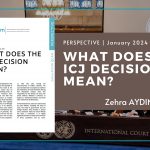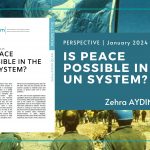The Israel-Palestine conflict, ongoing since 1948, has entered a new crisis period following Hamas’ attack on Israel on October 7th, becoming the forefront of the global agenda. Gaza has been bombarded by Israel for days, resulting in the deaths of thousands of civilians, mostly children and women. Of course, this crisis also occupies the agenda of states other than the parties involved. Western countries such as the United States, the United Kingdom, Germany, and France, per usual, have expressed their clear support for Israel since the very first day, while regional states such as Türkiye are trying all means of diplomacy. President Recep Tayyip Erdoğan and Foreign Minister Hakan Fidan in particular, have continued to hold effective discussions with officials from various countries since the beginning of the events, making active efforts to end the conflict and achieve a final solution.
Türkiye has put forward a real and concrete solution proposal for the resolution of the Israel-Palestine conflict. According to this proposal, it is advocated that the resolution of this long-standing crisis between Israel and Palestine is possible through a guarantor system involving Türkiye and other states, following the declaration of a ceasefire.
At this point, examining the concepts of guarantorship and mediation in international law is essential. In international law, guarantorship entails third-party states or international organizations, taking the obligations of an agreement under their own guarantees. This way, guarantor states or organizations are responsible for ensuring that the relevant agreement is not violated, and they are granted rights such as military intervention in case of violation. Therefore, guarantorship provides deterrence against parties which might break the obligations of the agreement. States with strong military capacity such as Türkiye will have a high degree of deterrence in this regard. Within this context, President Erdoğan and Foreign Minister Hakan Fidan stating how other states should also act as guarantors, underscores the importance of absolute impartiality. Indeed, the President mentions that Türkiye could undertake the guarantorship of the Palestinian side.
In the context of the Israel-Palestine conflict, another international law concept to consider is mediation, which is one of the peaceful methods of dispute settlement under Article 36 of the UN Charter. According to this article, a third-party state or international organization, brings the parties of conflict together in an environment where they can also present their own solution proposals to seek a resolution. This is important in terms of bringing parties together and conducting diplomacy. However, unlike guarantorship, mediation does not grant as many rights to the third party and its deterrence is limited to the relationship with the mediating states. Whereas in the guarantorship method, the continuity of the agreement is under the guarantee of the relevant third party and provides significant deterrence.
The Republic of Türkiye has historically presented many resolution proposals in various crises. For example, during the Bosnian war, the government of Turgut Özal proposed many peaceful solutions and put forward an Action Plan that could have prevented the bloody end of the Bosnian war. Nonetheless, the same way correct peaceful steps were not taken for Bosnia back then, they are not being taken for Palestine neither since 1948 nor today. Just as the international community and Western states overlooked the basic principles of international law such as deterrence and ensuring that the aggressor cannot commit the same attack again during the massacres in Bosnia and the genocide of Srebrenica, today we observe the same ignorance where a clear distinction between aggressor and victim is not made, and deterrent measures are not taken. Indeed, if a limited air operation had been carried out in a timely manner by NATO in accordance with the Action Plan presented by Türkiye for Bosnia in 1992, and even if a credible threat of force had been shown to the aggressor, the aggressor could have been deterred, and the territorial integrity of Bosnia and Herzegovina could have been preserved. Unfortunately, today, after thousands of people have been killed, injured, and displaced, with dozens of crimes against humanity, ethnic cleansing, and genocide have been committed, we can observe a Bosnia and Herzegovina state governed by the Dayton Agreement, consisting of two entities, ten cantons, and one autonomous region, with clearly separated borders and a complex political structure.
The territory of the Palestinian state has been shrinking gradually since 1948, both through direct occupation and through methods of land grabbing by settlers. Today, in the aftermath of the internationally unlawful crimes committed by Israel against the Palestinian people, Türkiye’s peace plans should be evaluated much more effectively to avoid hearing the words “we are too late” again, as was previously said for the events in Bosnia.
Indeed, compared to those days, the Republic of Türkiye is much more independent both economically and politically, and it is a state with higher capacity and international prestige. Especially in the last twenty years, the active and multidimensional foreign policy pursued has significantly strengthened Türkiye’s position in the region. President Erdoğan and his team, who have left 21 years behind in governance, have gained significant experience during this process. Türkiye’s importance has increased significantly, not only in its position among states but in the eyes of the regional public, particularly with the incident of “one-minute” and processes of Türkiye’s support for the democratic demands of society during the Arab Spring. Such situations today make Türkiye a state that gives hope to many people in the Israel-Palestine conflict. Another dimension is that, especially at the current stage of the Israel-Palestine conflict, it attracts much more attention in the global public opinion than the Bosnian war did. Particularly with the influence of social media, the spread of images and news surpasses the “CNN effect” seen in the Iraq war, where “misinformative” news presented through biased images from a single camera are countered. All these developments, on one hand, raise awareness in world public opinion, while on other hand, they push the public to take a decisive stance in support of the Palestinian people.
Türkiye is a state with experience in both guarantorship and mediation. Furthermore, Türkiye is the only state with high representation capability that can establish relations with both Middle Eastern states and Israel. In addition to its guarantorship in Cyprus, Türkiye mediated in the Iran-Iraq war, such that both countries’ mutual embassies located in Türkiye. Similarly, in the crisis between Israel and Syria over the Golan Heights, Türkiye took on a mediator role upon the request of both parties. It has also played an active role in the crises in Libya, Syria, and Armenia-Azerbaijan. All these experiences have increased Türkiye’s regional and global influence. Today, Türkiye’s assumption of a guarantor role in the Israel-Palestine conflict to ensure an absolute ceasefire under its guarantee, is of great importance to prevent further loss of life in Palestine.
Similarly, Türkiye’s initiatives under the Organization of Islamic Cooperation (OIC) are also important in mobilizing Islamic states regarding the Israel-Palestine conflict. Türkiye takes on a leading role in this regard. Indeed, the active diplomacy pursued has led to disruptions in the normalization processes between Arab states and Israel and has contributed to the emergence of a common stance. In this context, Türkiye also has the support of the public opinion of Islamic states. The Republic of Türkiye could also pioneer a more effective campaign by Islamic states against Israeli injustices in Palestine.
Unfortunately, it is difficult to speak on the effectiveness of the United Nations in solving the Israel-Palestine conflict today, as was the case in the massacres in Bosnia previously. This situation leads states to act on their own. While this brings about autonomy for Western states, who are absolute supporters of Israel, it imposes great responsibilities on states like Türkiye.
This article has been published by Anadolu Agency on October 31, 2023.









